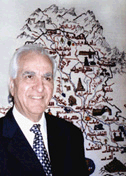Festival of Muslim Cultures:
An international not a local affair
Preparations are underway in Britain for the Festival of Muslim Cultures. Islamic Tourism Magazine has been invited to the preview of various activities planned in different venues throughout Britain during 2006. London will be the focal point but activities will extend to different parts of the UK, especially the areas with a high Muslim population such as Birmingham, Manchester, Leeds, Sheffield and Bradford, in addition to the main cities in Scotland and Wales. The festival is to be managed by a committee of Muslims and non-Muslims from government departments such as the Ministry of Culture as well as universities, heritage centres, art and sport centres and museums.
The Festival of Muslim Cultures represents a celebration of the arts, sciences and literature of Islamic Societies. It also reflects the contribution to the world’s knowledge and values made by Islamic countries and aims at promoting this contribution in Islamic and non-Islamic circles.
It is worth mentioning that this is the second festival of its kind. The first, «The World of Islam Festival», was held in 1976. The number of Muslims resident in the UK has risen significantly since that time. Around two million Muslims hold British passports and contribute to the economic, scientific and cultural life of Britain. In fact, Muslims represent the second largest religious community in Britain. Nevertheless the general public knows very little about Islam. There is also negative stereotyping and misunderstanding about Islam and Muslims prompted by certain events in the Muslim world and the tense relations between the Muslim world and the West.
The festival is an attempt to counter all these negative impressions and replace them with positive ones as well as strengthening the relationship between Muslim communities living in the West and their host societies.
The festival is an enlightened, positive project aimed at:
• Promoting widespread understanding of Muslim cultures among the British public and re-evaluating their contribution to human civilization as well as highlighting cultural exchanges between Islam and the West.
• Bringing leading exponents of the arts and sciences from across the Muslim world to a wider audience in the UK.
• Building ongoing dialogue among Muslims and between Muslims and non-Muslims in Britain and creating the conditions for a continuing dialogue after the festival.
• Creating the necessary context for producing and determining the Islamic identity of the Muslim community living in Britain and giving it direction in its contribution to British society at large.
Muslim countries and other countries with Islamic treasures should participate: they can have their own tents and stands depending on their resources and contributions. The British government, represented by the Ministry of Heritage, the London Mayoral Office and all those concerned should provide the necessary facilities to organise «camps» in Hyde Park for the participating countries. British establishments cannot be ignored.
Islamic Tourism participated in a preview of the festival during which several speeches were made. ITM had private talks with the organisers and distinguished guests, prominent among them Estelle Morris, the Minster of Art, Isabel Carlisle, the director of the festival, members of the diplomatic corps, especially the ambassadors of Saudi Arabia and Bahrain, distinguished personalities from the Muslim community, directors of British museums and cultural centres and British personalities from different sectors.
Mrs. Morris emphasised in her speech the important role culture plays in bringing nations together and the bridges it builds between generations. Ms. Carlisle, said that there is a need for dialogue about several present and urgent issues, such as the British media and Muslims, terrorism etc She referred to a number of forthcoming festival activities including arts functions such as concerts, films and plays, especially shows by the Khayaal Theatre Company which presents Islamic plays based on Sufi texts, such as poems by Al-Attar and Al-Rumi, as well as craft shows and Islamic art. Ms.Carlisle also mentioned some towns and cities throughout Britain where festival activities will be held. Programmes for schools are on the agenda and the festival will tour a number of European countries, the USA and Canada.
These activities and plans are commendable, but we have to move beyond the limited view of the function of the festival and an attempt should be made to invite Muslim countries to take part. It is a golden opportunity to include Muslim countries in cultural activities that aim at bringing together different faiths and nations, as we are now living in times of religious and racial tensions. The festival could become a landmark in the dialogue between different people and civilizations – it will be held in London a world capital renowned for the meeting of different civilizations and a home of human heritage. If this experience proves successful different countries will compete to host the festival as is the case with the Olympic Games. Like the Olympics the festival will bestow many advantages on the hosts. Tourists and visitors will acquaint themselves with Islamic art and the civilization of the states they visit and the host countries will raise their profile in the family of nations and benefit culturally as well as economically.
I therefore call on the organisers in Britain to exert every effort to make this unique festival a success. Hyde Park should be the focal point of the event which could be the biggest festival this country has ever seen.
Muslim countries and other countries with Islamic treasures should participate: they can have their own tents and stands depending on their resources and contributions. The British government, represented by the Ministry of Heritage, the London Mayoral Office and all those concerned should provide the necessary facilities to organise «camps» in Hyde Park for the participating countries. British establishments cannot be ignored. Museums and other institutions can be encouraged to take part at minimal cost.
Why Hyde Park?
Most festival activities should take place in July for three weeks. The best venue is Hyde Park in the centre of London . The park is in the centre of London ’s shopping area and its location will attract shoppers and visitors. It is also an ideal venue because: It is the centre of London’s shopping area and this will encourage the visitors to shop, and it will also encourage shoppers to visit the festival and stands.
1. It is situated between some of the best hotels in London.
2. It is surrounded by several underground stations, bus routes, car parks and other transport facilities which make it is easily accessible.
3. It could be divided into several sections, each representing a continent. The tents should be allocated a certain colour, for African, Arab, Asian, European and America states.
4. British institutions, whose activities are not in conflict with Islamic values can have stands at the festival. They can also promote the event and arrange transport through special coach services.
These are not the only advantages of making Hyde Park the epicentre of festival activities. The other benefits will become clear during and after the event.
Once the festival programme is finalised it is incumbent on Muslim countries in particular and states with an Islamic heritage in general to participate and take advantage of this unprecedented opportunity to promote their heritage and culture. The festival can serve as a template for annual festivals hosted by different capitals.
Islamic Tourism Magazine and its website are making all their resources available to cover the activities and news of the festival and its participants. We are eager to ensure the festival becomes one of the beacons on the map of international tourism.
May Allah guide us to the best of deeds.
|

